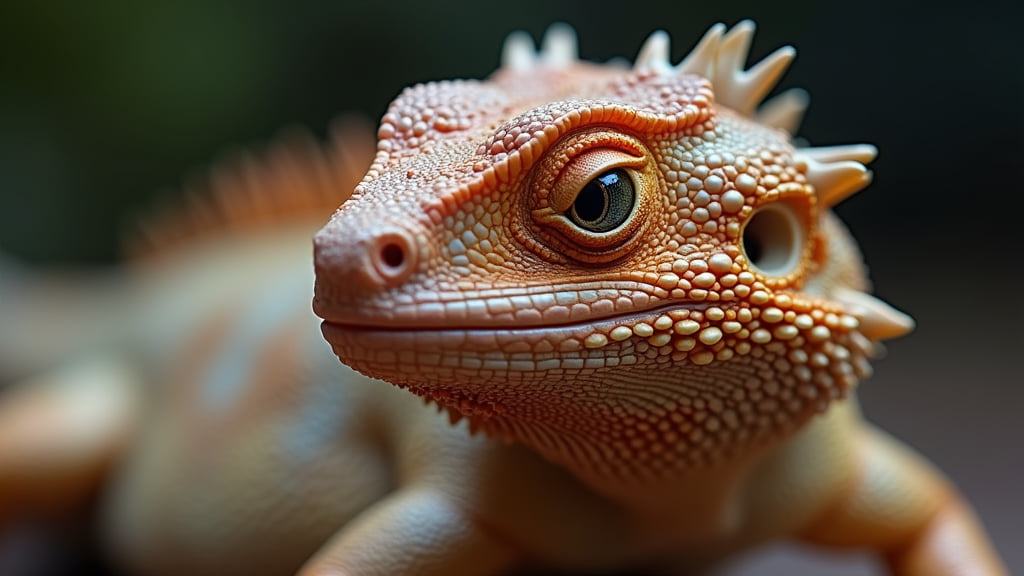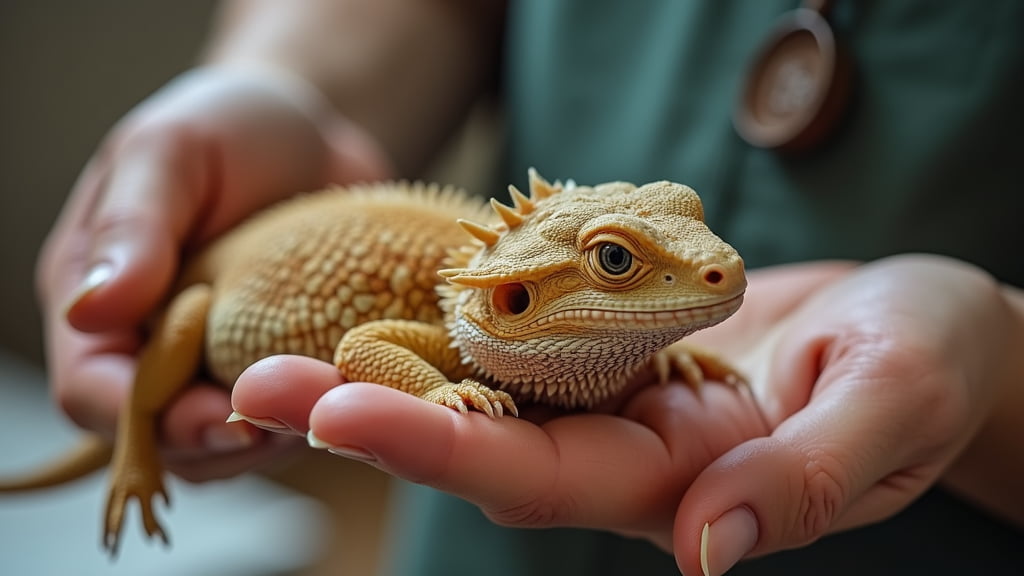Bearded dragons, scientifically known as Pogona, are reptiles native to Australia’s arid and semi-arid regions. These popular pets are characterized by their distinctive appearance, including a triangular head and a “beard” of spiny scales around their throat, which they can puff up and darken when threatened or displaying dominance. They also possess the ability to change color, particularly during mating or when stressed.
As pets, bearded dragons are known for their docile nature, friendliness, and curiosity. They are relatively low-maintenance and can be housed in terrariums or vivariums, making them suitable for reptile enthusiasts of various experience levels. Despite their hardiness, bearded dragons can be affected by various health issues.
It is crucial for owners to be knowledgeable about these potential problems and their prevention and treatment to ensure the well-being of their reptile companions.
Key Takeaways
- Bearded dragons are popular reptile pets known for their docile nature and unique appearance.
- Common health issues in bearded dragons include respiratory infections, metabolic bone disease, and parasitic infections.
- Respiratory infections in bearded dragons can be caused by poor husbandry, stress, or exposure to pathogens.
- Metabolic bone disease in bearded dragons is often a result of inadequate UVB lighting and calcium deficiency.
- Parasitic infections in bearded dragons can be caused by internal parasites such as worms or external parasites like mites.
Common Health Issues in Bearded Dragons
Common Health Issues in Bearded Dragons
Some of the most prevalent health issues in bearded dragons include respiratory infections, metabolic bone disease, and parasitic infections. These health issues can be caused by a range of factors, including poor husbandry, improper diet, and stress.
Recognizing Signs and Symptoms
It is crucial for bearded dragon owners to be aware of these common health issues and how to recognize the signs and symptoms. This enables them to seek appropriate veterinary care when necessary. In addition to respiratory infections, metabolic bone disease, and parasitic infections, bearded dragons can also suffer from other health issues such as impaction, shedding problems, and mouth rot.
Other Health Issues in Bearded Dragons
Impaction occurs when a bearded dragon ingests a foreign object that becomes lodged in its digestive tract, leading to blockages and other serious health issues. Shedding problems can occur when a bearded dragon is unable to shed its skin properly, leading to irritation and potential infection. Mouth rot, also known as stomatitis, is a bacterial infection that affects the mouth and gums of bearded dragons, causing pain and discomfort. It is essential for bearded dragon owners to be vigilant in monitoring their pet’s health and seeking veterinary care when necessary to ensure the best quality of life for their beloved reptile companions.
Respiratory Infections in Bearded Dragons

Respiratory infections are one of the most common health issues that affect bearded dragons. These infections can be caused by a variety of factors, including poor husbandry, stress, and exposure to cold temperatures. Respiratory infections in bearded dragons can present with symptoms such as wheezing, labored breathing, nasal discharge, and lethargy.
If left untreated, respiratory infections can lead to more serious health issues such as pneumonia and can even be fatal in severe cases. To prevent respiratory infections in bearded dragons, it is important for owners to provide proper husbandry and maintain appropriate environmental conditions. This includes providing a proper temperature gradient within the enclosure, ensuring adequate humidity levels, and providing a clean and well-ventilated living space for the bearded dragon.
It is also important to minimize stress and handle the bearded dragon gently to reduce the risk of respiratory infections. If a respiratory infection is suspected, it is important to seek veterinary care promptly to ensure proper diagnosis and treatment. In addition to proper husbandry and veterinary care, owners can also help prevent respiratory infections by feeding their bearded dragons a balanced diet and providing regular opportunities for exercise and mental stimulation.
By taking proactive measures to prevent respiratory infections, owners can help ensure the overall health and well-being of their beloved reptile companions.
Metabolic Bone Disease in Bearded Dragons
Metabolic bone disease is another common health issue that affects bearded dragons. This condition is caused by a deficiency in calcium, vitamin D3, or both, which can lead to weakened bones, deformities, and other serious health issues. Metabolic bone disease can occur as a result of improper diet, inadequate UVB lighting, or poor husbandry practices.
Symptoms of metabolic bone disease in bearded dragons can include soft or rubbery bones, tremors, difficulty walking, and fractures. To prevent metabolic bone disease in bearded dragons, it is important for owners to provide a balanced diet that includes calcium-rich foods such as dark leafy greens, insects, and commercial calcium supplements. In addition, it is important to provide adequate UVB lighting within the enclosure to ensure proper calcium metabolism and bone health.
Regular veterinary check-ups can also help detect early signs of metabolic bone disease and prevent its progression. In addition to proper diet and lighting, owners can also help prevent metabolic bone disease by providing appropriate environmental enrichment and opportunities for exercise. This includes providing climbing structures, basking spots, and other environmental stimuli that encourage natural behaviors and physical activity.
By taking proactive measures to prevent metabolic bone disease, owners can help ensure the overall health and well-being of their beloved reptile companions.
Parasitic Infections in Bearded Dragons
Parasitic infections are another common health issue that affects bearded dragons. These infections can be caused by a variety of parasites such as coccidia, pinworms, and mites, which can lead to symptoms such as diarrhea, weight loss, lethargy, and poor appetite. Parasitic infections in bearded dragons can occur as a result of poor hygiene, exposure to contaminated food or water, or contact with infected animals.
To prevent parasitic infections in bearded dragons, it is important for owners to maintain proper hygiene within the enclosure and provide clean food and water sources. Regular fecal examinations by a veterinarian can also help detect early signs of parasitic infections and prevent their progression. In addition, it is important to quarantine new animals before introducing them to an existing colony to prevent the spread of parasites.
In addition to proper hygiene and veterinary care, owners can also help prevent parasitic infections by providing regular opportunities for exercise and mental stimulation. This includes providing a clean and enriching living space for the bearded dragon that encourages natural behaviors and physical activity. By taking proactive measures to prevent parasitic infections, owners can help ensure the overall health and well-being of their beloved reptile companions.
Treatment Options for Bearded Dragons

Respiratory Infections
For respiratory infections, treatment may involve antibiotics to combat bacterial infections or supportive care such as nebulization to help clear the airways.
Metabolic Bone Disease and Parasitic Infections
In cases of metabolic bone disease, treatment may involve calcium supplementation, vitamin D3 therapy, and dietary modifications to improve bone health. For parasitic infections, deworming medications or other anti-parasitic treatments prescribed by a veterinarian may be necessary.
Supportive Care at Home
In addition to medical treatment, owners play a crucial role in providing supportive care at home to help their bearded dragon recover from illness. This includes maintaining proper environmental conditions within the enclosure, providing a balanced diet that supports recovery, and minimizing stress to promote healing. By working closely with a veterinarian and following their recommendations for treatment and care, owners can help ensure the best possible outcome for their beloved reptile companions.
Preventive Care for Bearded Dragons
Preventive care is essential for maintaining the overall health and well-being of bearded dragons. This includes providing proper husbandry, offering a balanced diet, maintaining appropriate environmental conditions within the enclosure, and seeking regular veterinary check-ups. Proper husbandry for bearded dragons involves providing a clean living space with appropriate temperature gradients, humidity levels, and UVB lighting.
It also includes offering opportunities for exercise and mental stimulation through environmental enrichment such as climbing structures and hiding spots. A balanced diet for bearded dragons should include a variety of calcium-rich foods such as dark leafy greens and insects as well as commercial vitamin supplements as needed. Regular veterinary check-ups are also an important part of preventive care for bearded dragons.
These check-ups allow veterinarians to monitor the overall health of the bearded dragon, detect early signs of illness or disease, and provide recommendations for preventive measures based on the specific needs of the individual animal. In conclusion, bearded dragons are unique reptile pets known for their friendly nature and distinctive appearance. While they are relatively low-maintenance pets compared to other animals like dogs or cats, they are still susceptible to a variety of health issues that can affect their overall well-being.
By being aware of common health issues such as respiratory infections, metabolic bone disease, and parasitic infections, owners can take proactive measures to prevent these issues from occurring and seek prompt veterinary care when necessary. With proper preventive care and attention to their specific needs, owners can help ensure the best quality of life for their beloved bearded dragon companions.
If you’re looking for a reliable source of live food for your bearded dragon, check out Dugs Bugs. They offer a variety of nutritious insects that can help keep your pet healthy and happy. In addition to proper nutrition, it’s important to be aware of common health issues and treatments for bearded dragons, which you can learn more about at Dugs Bugs. Understanding how to care for your bearded dragon is essential for their well-being, and Dugs Bugs provides valuable information on proper care and feeding for reptiles.
FAQs
What are some common health issues for bearded dragons?
Some common health issues for bearded dragons include metabolic bone disease, respiratory infections, parasites, and impaction.
How can metabolic bone disease be treated in bearded dragons?
Metabolic bone disease in bearded dragons can be treated by providing proper UVB lighting, calcium supplementation, and a balanced diet.
What are the symptoms of respiratory infections in bearded dragons?
Symptoms of respiratory infections in bearded dragons include wheezing, open-mouth breathing, mucus around the nostrils, and lethargy.
How are respiratory infections treated in bearded dragons?
Respiratory infections in bearded dragons are typically treated with antibiotics prescribed by a veterinarian, along with supportive care such as maintaining proper humidity levels and providing a warm basking spot.
What are some common parasites that affect bearded dragons?
Common parasites that affect bearded dragons include pinworms, coccidia, and mites.
How can parasites be treated in bearded dragons?
Parasites in bearded dragons can be treated with deworming medications and proper hygiene and cleaning of the enclosure.
What is impaction in bearded dragons and how is it treated?
Impaction in bearded dragons occurs when they ingest a foreign object that causes a blockage in their digestive system. It can be treated by providing a warm bath to help stimulate bowel movements and seeking veterinary care if the impaction does not resolve.




